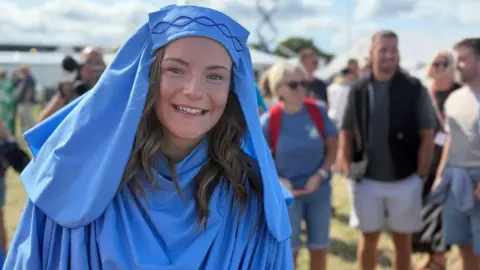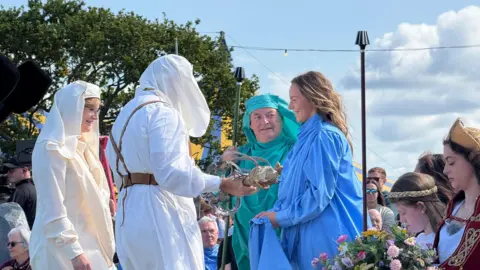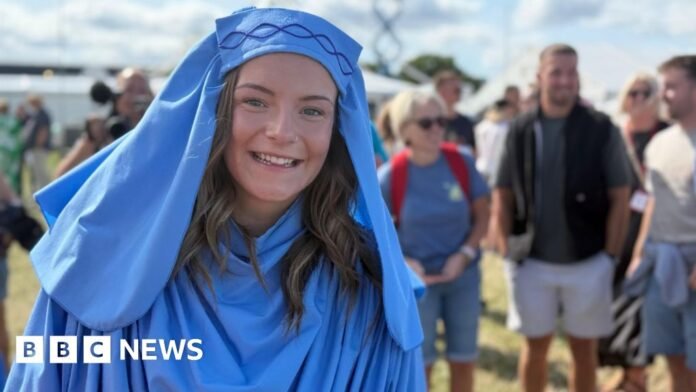 BBC
BBCA Wrexham footballer says it’s “such a privilege” to receive one of Wales’ highest honours at the National Eisteddfod.
Lili Jones, 19, who has played since the age of five, was recognised for her impact on women’s football, her support for young female footballers’ well-being, and her work in promoting Welsh culture.
She said having the festival in her hometown was “perfect timing” and “incredible”, as it has helped more people from across the area learn Welsh.
After losing her dad four years ago, she described the day as “special” and “quite emotional”, as her family watched her receive a blue robe at the Gorsedd of the Bards ceremony on Friday.
The celebration is composed of individuals who have made significant contributions to Wales, its language and culture.
Those who have excelled in fields such as law, science, sports, journalism, media and local or national activities are inducted as honorary druids, receiving blue robes, in recognition of their services to the nation.
 Family image
Family imageJones’s football journey began with a local boys’ team.
At 12, after she could no longer play with them at secondary school, she moved to Wrexham’s women’s foundation before being signed by Everton where she completed two seasons.
She returned to Wrexham at 15 and made her senior debut for Wrexham AFC Women at just 16 in September 2021, scoring twice.
In 2023 she was the club’s youngest player to be awarded a semi-professional contract.
A familiar voice on radio and TV, Jones has regularly discussed football’s impact on young women’s physical and mental health.
She has promoted Wrexham and the Welsh language on programmes worldwide, including the popular Welcome to Wrexham documentary series – for all of this work, she was honoured with the robe.

Jones found out the news during a football tournament in Hong Kong after receiving a call telling her to check her emails.
“At first, I found it hard to reconcile the nomination with what I’d actually done,” she said.
“The things I do are things I love and do naturally – I’m passionate about football and the Welsh language. So being recognised for something that feels so natural made me question whether I deserved it.”
Jones, who studies Welsh at university, described wearing the robe as “an amazing feeling” and said she was “so grateful”.
She called it a “really special moment” and “something I’ll hold close to my heart for the rest of my life”, especially since her bardic name included her dad’s name.
 Getty Images
Getty ImagesJones described having the Eisteddfod in her local area as “incredible”.
She said the city has enjoyed a “really great few days”, and the festival has been “awesome” for the Welsh community.
“It’s been lovely seeing so many familiar faces around the Maes. Everyone is just so happy,” she said.
“There might be some bias when the Eisteddfod comes to your area, you think it’s the best thing in the world, but honestly, it has been unbelievable.”
Jones explained the festival has encouraged many local learners to practice their language “without feeling judged”.
She believes that since Rob McElhenney and Ryan Reynolds’ takeover of the football team, people in Wrexham are starting to “feel really seen, which is nice”, and the Eisteddfod has only helped with that.
“We’re riding the high of the Eisteddfod now, but I think we’ll struggle when it’s over,” she said.
More than 150,000 people have attended the National Eisteddfod this week, with 6,000 competitors showcasing the best Welsh language art, music, drama and literature.
It is held in north and south Wales on alternate years and it’s the first time since 2011 that the eisteddfod has been held in the area.





